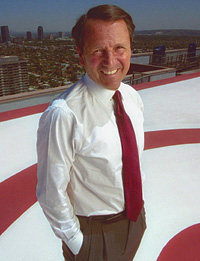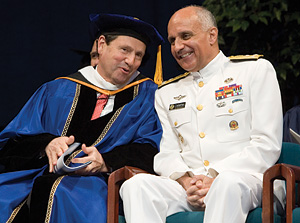Gerald Parsky ’68 Blends Politics and Principle to Achieve Reform
 Gerald Parsky '68 |
Cullen Couch
Just a few years into his first job out of Virginia, Gerald Parsky fielded a phone call that would change his life. The late Edwin Cohen ’36, his old professor at the Law School and then assistant secretary of the treasury for tax policy in the Nixon administration, was looking for an assistant. He wanted Parsky. The young lawyer leapt at the opportunity, beginning a career in law and politics that the former Princeton English major and E. M. Forster expert never would have dreamed of pursuing.
Parsky would serve under Presidents Nixon and Ford, and become assistant secretary of the treasury and an economic and political counselor to three more presidents. He would serve on Ronald Reagan’s transition team and on his President’s Council on Productivity, the President’s Export Council under George H. W. Bush, and the President’s Commission to Strengthen Social Security for George W. Bush. A longtime family friend of the Bushes, Parsky is the president’s political confidant in California.
Parsky’s life in and around politics has taught him the value of compromise, a virtue in short supply in today’s policy debates. “You don’t have to compromise your principles,” he says, “but you do have to be open to understanding that there may be different points of view.”
 In this 2005 photo, Gerald Parsky, chairman of the Regents of the University of California, talks with U.S. Surgeon General Richard Carmona at the inauguration of Chancellor Michael V. Drake of University of California, Irvine. (UC, Irvine photo) |
Rapid Rise
Parsky joined the Tax Legislative Council staff as executive assistant to Cohen in November, 1971. The following spring, he went with Cohen to a meeting with Treasury Secretary George Shultz. Shultz asked Cohen to recommend someone who could analyze some economic and tax proposals associated with the upcoming Nixon presidential campaign. Cohen immediately pointed to the little-known Parsky. As a result, Parsky worked closely with Shultz throughout 1972 and Shultz became a real mentor. When Cohen left the Treasury Department in late 1972, Shultz asked Parsky to stay and introduced him to William Simon, who joined as deputy secretary. Shultz and Simon soon put Parsky on everything that came through the Treasury Department, giving him broad experience in economics, capital markets, and finance.
When the oil embargo hit in October 1973, Shultz asked Parsky to create an office to deal with the crisis. Parsky moved to the White House to create the Federal Energy Office, where he assumed the thankless job of allocating oil to the states. In trying to untangle the snaking lines of fuel-starved automobiles at gas stations throughout the country, he learned his first lessons on managing competing interests in a stressful political environment.
He was a quick study. Parsky’s work as policy aide for Cohen and Shultz had kept him relatively removed from the Washington political scene and “not very knowledgeable about politics.” But now he was attracting the interest of everybody in politics who wanted their gas lines to be as short as possible. “I had to work with both Democrats and Republicans to try to do something that was fair for the entire country.”
He learned that an effective political appointee must work for the public as a whole. “The only way you can serve the public,” says Parsky, “is to stick to your principles but learn how to compromise with people of another political party. We were all facing a crisis together. It often takes a crisis to get people to step back and ask, ‘Well, what’s in the best interest of the country as a whole?’”
 Motorists line up at a gas station on New York’s Long Island, hoping to fill their tanks during the gasoline shortage of 1973–1974. Long lines and fuel restrictions were common across the country. (AP photo) |
With the energy crisis easing, Parsky was about to return to the private sector, but Shultz gave Parsky the opportunity to manage all international matters concerning oil, energy, and the capital markets. Nominated and confirmed in early 1974, he became the youngest assistant treasury secretary in the history of the department. Time magazine called him “Treasury’s Wunderkind,” a “lean, tireless, dapper, and serenely poised” public servant who was “one of the administration’s most powerful bright young men.”
As assistant secretary, Parsky worked with the IMF and the World Bank to build programs with oil-producing countries. He built a capital markets group that developed into a full assistant secretary position of its own. “It was a terrific experience for a young person. I entered the government as an independent. I left the government as a true Republican, a conservative economic thinker, and very much free trade-oriented. But I also left with the strong belief that you had a responsibility as a public servant to work across party lines. You can’t start and stop with the notion that it’s ‘my way or no way’ on every issue.”
Private Success and Political Agility
Parsky’s contacts and in-depth understanding of world markets would serve him well. He left Treasury in 1977 when William French Smith at Gibson Dunn & Crutcher asked him to join the firm as the first lateral partner the firm had ever hired. Parsky helped the firm open offices in Washington, New York, London, Saudi Arabia, Hong Kong, and Tokyo as he built a law practice around the movement of capital between American and foreign business interests. As a result of the success of this practice, he became a senior partner and a member of the management committee in 1983. He was the youngest senior partner. His practice evolved into counseling people who make capital decisions, so he decided to set up his own investment company in 1991. He formed Aurora Capital, a Los Angeles-based investment firm that acquires and builds companies in partnership with operating management.
Meanwhile, Parsky has continued to write policy positions for the Republican Party and work with its candidates. “I had come out of a high government position as a Republican, so it was a pretty natural thing to do. I don’t want to go back into government, but I feel that, given my experience, if I can help presidents or elected leaders on a policy level, then I’m willing to do that.”
Parsky has taken on the role of the Bush administration’s point man in California. He has tried gamely to reverse the California Republican Party’s poor electoral record in this heavily Democratic state. Despite the gravitas that his Washington connections bring, it has been an uphill battle. Parsky has infuriated party activists in his attempt to develop policy positions more attractive to women and minorities. In fact, his moderate views have excited more ardent opponents in his own state party than within the Democratic Party. “A relatively small group characterizes itself as ‘the conservative Republicans,’” says Parsky. “They believe you must agree with them on every issue or you’re not a true Republican. That’s destructive to the party. Most conservative Republicans understand that.”
Parsky essentially inhabits the center of a political triangle, with one point the national party, one his “extremist” state party, and the other the Democrats. But over his years in public service, and as a successful lawyer and capitalist in the private sector, he has developed the savvy and political agility required for such a balancing act.
Only Parsky could have brokered the unique agreement between the Bush administration and Democratic Senators Dianne Feinstein and Barbara Boxer that created a bipartisan commission on federal judges. It has proved to be an unqualified success and a model the country could well use nationally. Parsky is “very proud” of how it has worked. “I’m especially grateful to Senator Feinstein. She’s been fabulous. I think a cross-section of lawyers in California would say we’ve done a public service.”
True to form, the then chairman of the state Republican Party wrote an op-ed piece in the Los Angeles Times saying it was “outrageous” that Parsky would work with a Democrat. “That was his attitude, but it’s illustrative of this kind of extreme element” in the state party says Parsky.
Leads UC Board of Regents Through Diversity, Compensation Issues
Governor Pete Wilson appointed Parsky in 1996 to the Board of Regents of the University of California. Parsky faced understandable suspicion that his strong Republican ties would unduly influence him and inject partisan ideology into the board’s deliberations. He did nothing of the sort, claiming that as a Regent he would represent all Californians. Since his appointment, he has won over doubters with his cool professionalism and deep knowledge of the issues facing public education. In fact, three years ago he won unanimous support from the Regents, Democrats and Republicans, when they elected him chair.
Admissions issues took on greater urgency after California enacted Proposition 209 in 1996. The proposition abolished affirmative action at the University of California. Minority enrollment plunged. To remedy the problem, the regents adopted in 2001 a policy called “comprehensive review” which allowed campuses to consider factors such as leadership and socioeconomic status in their admission decisions. Departing from the stance of his Republican colleagues who fought against the measure, Parsky voted for it. “I think that a diverse student body at the university is a very important element to one’s education.” he said, “Providing the opportunity for education to all students who are qualified is an avenue to improve the quality of your life and your ability to contribute.”
Normally, the chair’s term is two years, but his fellow regents asked him to extend his term last year to manage a burgeoning compensation scandal involving under-the-table payments to about 60 top executives in the UC system. It was a juicy story, just the ticket for a media swarm. Typical was the Sacramento Bee, which said “the fact that Gerald Parsky, President Bush’s best friend in California, chairs the Board of Regents, heightens the political drama. With Bush’s popularity extremely low in California, Democrats will have no compunction about taking potshots at Parsky for letting abuses occur.” But in typical Parsky fashion, he skillfully got ahead of the firestorm, stating firmly at the outset that “transparency is what this public institution is all about and we’ll hurt our ability to maintain our image as a great university unless we correct this.” By November, the scandal had run its course with safeguards put in place to prevent future abuses and ensure the university’s “openness and transparency.” This past January, Parsky yielded the chair to his successor.
Parsky still has a year to serve as a Regent, and Governor Schwarzenegger recently appointed him chair of a new commission reviewing the public pension crisis in California. Meanwhile, his full-time job at Aurora Capital keeps him busy working with “a wonderful group buying and building really quality companies.” Will he step into national politics again? “We’ll see. Let me put it this way. I feel very grateful to a society that has given me opportunities that my dad didn’t have. He wasn’t able to go to college and insisted that if I had the drive and the desire to be educated, he wanted to make sure that happened. I’m very grateful for that, and I feel that if you can find ways to give back to a society that’s been good to you, you should try to do that.”
Parsky has followed that credo since the phone call from Eddie Cohen many years ago. He has found, time and again, the middle ground between principle and compromise that allows reasonable parties to come together. He sees an ever greater need for that today. “I think the American people want some level of independent thinking. They want people who will do what they believe is right for America. They want people who will be bipartisan when it’s in the public interest. They want collegiality, not ideological partisanship. If you show the ability to show respect for the other side, then I think you’ve got a chance to move things forward.




